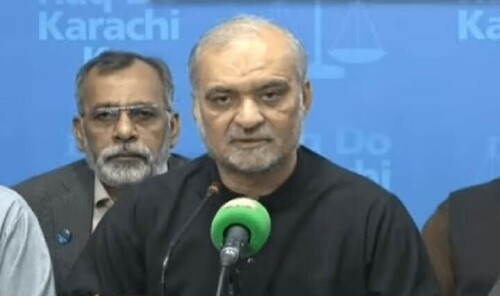KARACHI, April 25: History of the ethno-nationalist movements in Europe and their impact on immigration was discussed at a workshop titled “Politics of identity in contemporary Europe: challenges for the cultural coherence of the European Union in the context of national, ethnic and ultra-right politics,” organised by the Area Study Centre for Europe at Karachi University in collaboration with the Hanns Seidel Foundation, Islamabad on Thursday.
Dr Rashid Ahmad Khan, dean of the faculty of Arts, Social Sciences and Law at the University of Sargodha, began his talk by describing the inherent difference between what is considered ethnicity and nationality. He said the rise of xenophobic movements in Europe relates directly to Europeans living for decades in conditions of mass unemployment and job uncertainty. He explained that they felt threatened that new waves of immigrants were taking over the few employment opportunities they were left with. “There is also the fear of alien culture or of being swamped into a sea of alien culture,” he added.
Adding to a growing sense of paranoia and hostility in Europe is the rise of right-wing politics in the region, said Dr Mutahir Ahmed, a professor at the Department of International Relations at the University of Karachi, while providing a brief history of right-wing politics in Europe.
“This has propagated the fears of a clash of civilisations in the West,” he said, adding that this had been gaining momentum for the past two decades.
Dr Tanveer Khalid from the Political Science Department of Karachi University spoke about the ‘Identification of Europe by the international community: A Pakistani perspective’.
Referring to the war against terrorism, she said: “Pakistan’s strategic position must be better analysed by European states. This should be done in a way that does not show extra concern regarding religious, ethnic and ideological issues while ignoring the political and security aspect altogether. Pakistan expects more and is willing to do more but has concerns regarding certain global issues as well as dialogues on issues of specific concern to Pakistan i.e. relations with India, the situation in Kashmir and Palestine.”
Sajjad Ahmad, a research fellow at the ASCE, talked about using Scotland as a case study when discussing European integration and the challenges of nationalism.
He gave an account of the history of nationalism and the system of government in Scotland and how it was linked and affected by the UK. Mr Ahmad mentioned that the nationalist movement in Scotland was not as violent as was in other parts of the world. He also highlighted the UK’s accommodating nature when dealing with Scotland’s nationalist movement where the people of Scotland would get to decide upon its secession at the referendum that would take place there next year.
Earlier, Dr Uzma Shujaat, official in charge of the ASCE, said: “Globalisation and the process of economic de-territorialisation will stimulate the demand for a redefinition of identities in Europe.”
She said developing a European identity was high on the list of EU priorities. It would be interesting to see how institutions created a European culture while retaining national identities, she added.













































Dear visitor, the comments section is undergoing an overhaul and will return soon.